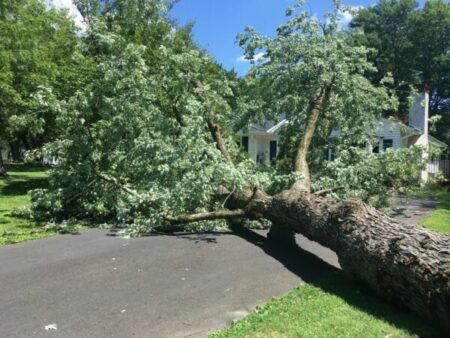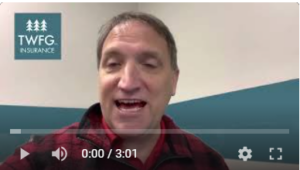
If a Tree Falls, Who is Liable for Damages?
Every year, storms are responsible for felling innumerable trees and limbs—unfortunately, some of those fallen trees damage homes and other property. Mopping up the damage from a windstorm can be a challenging task, both physically and emotionally, and things can become extremely tense when you find that it’s your neighbor’s tree that damaged your home.
To make matters worse, many homeowners are shocked to find that if a neighbor’s tree falls on their home, it’s typically their own homeowners’ insurance—not their neighbor’s—that will pay the cost of the damages. Following are some general guidelines for who pays what in different situations, but you should also inspect your homeowners’ policy for coverages and exclusions.
Your Property, Your Policy
Typically, if your property is damaged, you are responsible for the damages. It matters not if the tree or limb came from your property, your neighbor’s property, or even property owned by a government.
A windstorm isn’t any particular person’s fault; it’s an act of God. If a tree causes damage to your property during a storm, your policy will cover the damages. After all, that’s why you bought a homeowners policy—to protect yourself against unexpected losses like a tree damaging your home.
Their Property, Their Policy
It may seem quite unfair that when it’s your neighbor’s tree that damages your home, you have to pay. Fortunately for you, that rationale goes both ways. If a storm comes through your community and your tree falls and damages your neighbor’s house, their insurance is responsible for the damages.
Negligence and Liability
So far, these scenarios have been relatively clear, but what happens when it wasn’t a storm that caused the tree to fall?
Rather, your neighbor’s tree was rotten from years of disease, and they failed to do anything about it. As a matter of fact, it was so diseased that you voiced your concern to your neighbor that it might fall over and damage your house. Unfortunately, one day, that’s exactly what occurs. What happens then?
Your insurance company is still going to be on the hook for your claim. That being said, if you can prove your neighbor knew that the tree was rotten and that they chose not to address it, your insurance company would probably try to recover from your neighbor’s insurance. If your insurance company is successful, you might be reimbursed for your out-of-pocket deductible.
Again, this rule also applies both ways. If you have a diseased tree on your property and it damages your neighbor’s home, they can try to prove your negligence. To protect yourself from damage or liability claims, you should make it a habit to inspect your trees each year.
Other Structures
Are you still protected if the tree doesn’t damage your home but instead damages your shed? Generally, yes, you are.
Most homeowners’ policies differentiate between two distinct kinds of structures on your property. The “dwelling” refers to your house and any connected structures (like an attached garage), as well as any fixtures attached to the house. “Other structures,” including detached garages, sheds, fences, or gazebos, are also insured, but typically only for 10% of the coverage on your dwelling.
Vehicles
If, in the aftermath of a windstorm, you find that a tree has fallen on your automobile, your homeowners’ policy doesn’t apply. Rather, you’ll be using your auto policy.
If you have comprehensive protection on your car, your auto insurance company will pay for the damages after you pay your deductible. The same would apply to a visitor’s car. Hopefully, they have comprehensive coverage, also.
Removal and Cleanup
What happens if the tree fell but didn’t hit anything? Would you be protected from removal costs?
If the fallen tree blocks a pathway to your front door or driveway, then many homeowners policies would pay for removal. Typically, the maximum coverage is around $500.
However, if the tree just falls in your yard, your policy probably won’t cover it; there is no loss to file a claim for.
Replacement
Replacement of the trees can be more complex. Trees that fall due to wind may or may not be covered. Check with your agent.

